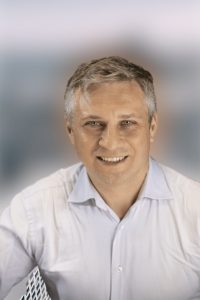This material first appeared as an article in SlavFile, the newsletter of the Slavic Languages Division, here. Published with permission from the SlavFile editor and the author.
By Dmitry Beschetny
I joined ATA a couple of months prior to the ATA62 annual conference. Not long before that, I came across a colleague’s article full of doom and gloom and claims that the majority of literary translators (she was addressing literary translators working into Russian) had no option but to keep translating prodigious amounts of pulp fiction for the kopeks the publishing houses pay them. Even if they were lucky enough to translate a landmark piece, their rates wouldn’t increase, as they still would be working for publishing houses—the only difference would be that they’d have to put a lot more effort into their work. This got me wondering why my colleague said nothing about working directly with authors and why anyone caught up in such a system wouldn’t try to find a better alternative.
Of course, stepping out of a comfort zone can be somewhat frightening, but I believe language professionals do not have to necessarily step out of it to acquire new skills and habits so that they can eventually find lucrative business opportunities and enjoy their lives doing things they really want to do. I’m also not too sure that translating tons of poor texts only to pay the bills can be regarded as a comfort zone.
At about the same time, I discovered that listening to industry-specific podcasts could be a great way to develop professionally. All the more so as I was suffering from eye strain caused by a large translation workload. Who wasn’t? I turned therefore to listening.
Both my favorites—Slovo, a podcast of the ATA Slavic Languages Division and Smart Habits for Translators, a podcast produced by ATA translators that addresses balancing the challenges that come with building a freelance translation career and maintaining clarity and boundaries between work and personal life—instill a mindset quite different from that endorsed by my colleague. Both encourage their audiences of language professionals to develop their marketing skills, among others. Neither gloom nor doom there! So, from the very beginning of my translation podcast listener’s experience, my primary focus has been on professional development with ATA.
These podcasts have given me marketing knowledge that I lacked before, and I keep learning from both the hosts and their guests, many of whom are ATA members. As mentioned in Smart Habits for Translators’ Episode 3: Conference Habits, “In-person networking events can be a major source of inspiration and energy for translators and a great way to meet new colleagues and clients. Besides, attending the ATA Annual Conference can be a worthwhile investment.” Naturally, the question arose as to how to reap the maximum benefit from it, and the podcast co-hosts had answers.
Interestingly, one point the co-hosts raised was that big conferences can be truly exhausting for introverts or people who prefer not to toot their own horn. I hasten to say here that I didn’t always agree with the hosts and guests of these fascinating podcasts, but that is probably something to talk about in another article or interview.
For now, I’d like to take a closer look at the much-discussed concept of the comfort zone we have to step out of from time to time to become better translators. From my perspective, doing things you really like is unlikely to be mentally exhausting, because those things tend to recharge us. I think attending a conference when you are a business owner, which is what the majority of translators and interpreters are, is quite different from attending a conference as an employee. I’d say it’s never boring when it’s your own decision to get your teeth into something. And yet, I have to agree it can be demanding physically, especially when you’ve traveled a long way across many time zones. So, I had to think twice before registering for ATA62.
In Slovo’s Episode 15 with Chris Durban, it was suggested that marketing is not the only road to success: following a role model’s example can also be very effective. It struck me that the ATA Annual Conference could be a chance for me to finally meet, in real life, Judy Jenner, a U.S.-based translator and federally-certified court interpreter who is a role model of mine.
To enter the U.S. and attend the conference, I needed a letter showing the purpose of my trip, and it was very nice and helpful when Madalena Sánchez Zampaulo, then the ATA President-Elect, replied quickly to my email request, having copied Executive Director Walter Bacak and Events Manager Adrian Aleckna, so I had the document I needed right away. That was how I learned who’s responsible for organizing the ATA Annual Conferences and how open and friendly ATA is. First impressions count, and my first impression of how ATA works was just perfect.
In order to better prepare for the conference, it was nice to have a website with the schedule and the list of attendees, so I could schedule some meetings ahead of time. And it is particularly important that all the conference-session recordings are available on that site now, as it was impossible to attend all the sessions of interest in real time.
Before heading to Minneapolis, I set up my work email auto-reply to tell my clients I would be in another time zone without a consistent Internet connection. As things turned out, the Wi-Fi connection at the conference hotel was trouble-free, so I could still perform urgent tasks between conference sessions.
At the conference, I took the ATA certification exam (which I was happy to recently learn I passed), and I appreciate very much the efforts that ATA certification exam practice group administrators Maria Guzenko and Eugenia Tietz-Sokolskaya made to better prepare the candidates. I also appreciate my partner/colleagues’ comments during our practice exercises. That was really helpful.
When I joined ATA, I also joined its Slavic Languages Division and Law Division. At the conference, however, one of my discoveries was that language professionals working with other language combinations and in other areas of expertise are also interesting to talk to.
As expected, I met many interesting people at the conference, some of them for the first time in-person and some of them for the first time under any circumstances, and we had meaningful conversations. I especially liked the Buddies Welcome Newbies program and the networking sessions. And believe it or not, I had an opportunity to meet my role model Judy Jenner at a networking session and she was open to talk and to share her terrific expertise!
I think that ATA membership and attending ATA conferences is a gateway into the North American translation market and that participation in other ATA professional development events leads to a better understanding of how to succeed in this market. With that in mind, it was good to meet industry-related people from other organizations at the Conference Exhibition Hall, including representatives of NAJIT and other professional associations and ATA chapters, the U.S. Department of State, LSPs and, interestingly, web-designer Amanda Calvin, who specializes in creating websites for translators and interpreters.
For me, this conference was very involving emotionally and full of exciting moments I would never have anticipated and could not have been part of as a virtual attendee. What I certainly didn’t expect was to see Madalena Sánchez Zampaulo breaking into tears of joy right there on stage when taking over from Ted Wozniak as ATA President. Unforgettable, very emotional and so touching! That was probably my favorite moment at the conference. Needless to say, the conference organizers did a great job of making this conference a success during a tension-filled pandemic. We are humans, not robots. We laugh and we cry.
The conference week was also full of humor and fun, and I had a great time hanging with my colleagues and new friends in the beautiful city of Minneapolis.
In conclusion, I recall what Veronika Demichelis said in her election speech when vying (successfully!) for the role of president-elect, “Joining ATA was one of the best decisions in my life.” The same goes for me.
Author bio

Dmitry Beschetny is an English>Russian translator and interpreter specializing in legal translation and court interpreting, based in Moscow. He holds a master’s degree in law and a master’s degree in humanities and social sciences, also having an academic qualification in translation studies.
Dmitry has extensive experience in criminal investigation and public prosecution. He has also worked as an in-house lawyer, and a legal counsel with law firms before turning his previous career into his area of specialization in the T&I industry. He has been translating and interpreting for academia, law firms and private clients. Dmitry can be reached at db@legalxlator.com.

Leave a Reply